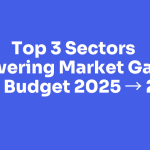In a market where sectoral trends shape investor returns, pharma mutual funds continue to stand resilient. With India’s healthcare and pharmaceutical industry poised to grow exponentially due to ageing demographics, rising health awareness, and increasing exports, investors are eyeing this segment for long-term value. In this context, we review five prominent pharma mutual funds that have shown impressive potential and are helmed by experienced fund managers.
These funds are distinct from infra sector mutual funds or infrastructure mutual funds that focus on core economy sectors. While infrastructure may benefit from capital expenditure cycles, pharma relies on innovation, regulatory clarity, and global demand trends. For long-term investors looking for diversification, sectoral funds such as pharma offer a unique alpha opportunity when timed with the business cycle.
Let us explore five leading pharma mutual funds in detail.
Launched on October 4, 2023, the HDFC Pharma and Healthcare Fund is a relatively new entrant but has quickly gathered an Asset Under Management (AUM) of ₹1,786 crores. The current Net Asset Value (NAV) stands at ₹17.60. Over the past one year, the fund has delivered a return of 27.3%. The fund has a strong equity orientation with 97.9% of the portfolio in equities. The allocation across market caps includes 41.1% in large caps, 18.1% in mid caps, and 38.8% in small caps. The fund is managed by Nikhil Mathur and has a beta of 0.7, indicating relatively low volatility, and a Jensen’s Alpha of 1.8.
Introduced on February 6, 2024, the WhiteOak Capital Pharma and Healthcare Fund has a NAV of ₹13.90 and a total AUM of ₹364 crores. Despite being new, the fund has delivered a 24.6% return in its first year. It holds 92.5% of its assets in equities and 2.8% in debt. Market cap distribution stands at 37.7% in large caps, 18.4% in mid caps, and 36.4% in small caps. Fund managers Ramesh Mantri and Dheeresh Pathak bring in-depth sector expertise. With a beta of 1.0, the fund has shown moderate correlation with the market and a Jensen’s Alpha of 0.6.
One of the oldest pharma funds in the Indian market, the SBI Healthcare Opportunities Fund was launched on July 14, 1999. With an AUM of ₹3,849 crores and an NAV of ₹439.90, the fund is well-established. Over the past one year, it has delivered a return of 19.4%, while its three-year and five-year CAGR returns stand at 28% and 23.5% respectively. The fund allocates 97% to equities and has a diversified market cap exposure: 41.9% in large caps, 16.7% in mid caps, and 33.6% in small caps. It is managed by Tanmaya Desai and Pradeep Kesavan. Its beta is 0.8, and Jensen’s Alpha is 0.4, indicating stable but lower excess return potential.
Launched on July 13, 2018, the ICICI Pru P.H.D Fund is one of the largest in the category, with an AUM of ₹5,728 crores and a NAV of ₹40.50. It has delivered a one-year return of 19.1%, a three-year return of 28.7%, and a five-year return of 24%. The fund has invested 96.4% in equities and 3.6% in other instruments. Market cap exposure includes 49.2% in large caps, 16.2% in mid caps, and 31% in small caps. The fund is managed by Dharmesh Kakkad, with a beta of 0.7 and Jensen’s Alpha of 1.2, suggesting strong risk-adjusted performance.
With a long track record since its inception on August 1, 2005, the UTI Healthcare Fund is another seasoned player. It manages ₹1,099 crores in assets and has a NAV of ₹295. In the last one year, the fund returned 18.5%. It has delivered 26.3% CAGR over the past three years and 21.7% over five years. The fund has 98.9% of its corpus in equities, with a focus on 34.2% large caps, 21.7% mid caps, and 42.9% small caps. Kamal Gada, the fund manager, has kept the fund’s beta at 0.7 with a Jensen’s Alpha of 1.0, reflecting consistent outperformance.
Final Thoughts
Pharma mutual funds have shown consistent performance and are backed by India’s structural healthcare growth. These funds are actively managed by experienced professionals and are suited for investors with a high-risk appetite and long-term investment horizon. However, it’s important to remember that sectoral funds are cyclical and may underperform during non-trending periods. Diversifying across sectors, including infrastructure mutual funds or infra sector mutual funds, can offer a well-rounded portfolio for steady growth.
Before investing, always consult with a registered financial advisor and evaluate how sectoral funds fit into your overall asset allocation strategy.
DIsclaimer
The blog is for information purposes only and anything mentioned herein shouldn’t be construed as a reason to buy/hold/sell any stock or a mutual fund. Furthermore, the information provided in the blog and observations made therefrom shouldn’t be treated as the extension of recommendations made on the other properties of Ventura Securities. If you follow any research recommendations made by our fundamental or technical experts, you should also read associated risk factors and disclaimers.
Mutual Funds are subject to market risks and you should pay close attention to risk factors before investing. We strongly suggest you to consult your financial advisor before taking any decision pertaining to your finances. Asset allocation becomes extremely relevant.
We, Ventura Securities Ltd, (SEBI Registration Number INH000001634) its Analysts & Associates with regard to blog article hereby solemnly declare & disclose that:
We do not have any financial interest of any nature in the company. We do not individually or collectively hold 1% or more of the securities of the company. We do not have any other material conflict of interest in the company. We do not act as a market maker in securities of the company. We do not have any directorships or other material relationships with the company. We do not have any personal interests in the securities of the company. We do not have any past significant relationships with the company such as Investment Banking or other advisory assignments or intermediary relationships. We are not responsible for the risk associated with the investment/disinvestment decision made on the basis of this blog article.

Budget-to-Budget Winners: Top Performing Defence Stocks from 2025 to 2026
4 min Read Jan 23, 2026
How Top Rare Earth Metal Stocks Performed in FY26: Hindustan Copper, GMDC, MOIL, OMDC
4 min Read Jan 23, 2026
Hot Sectors to Watch Out: Top 3 Performing Sectors From Budget 2025 to Budget 2026
4 min Read Jan 23, 2026
What is Geothermal Energy? India’s First National Geothermal Energy Policy
4 min Read Jan 23, 2026
Gold Price Outlook 2026: $5,000 Rally or $4,600 Pullback Ahead?
4 min Read Jan 22, 2026